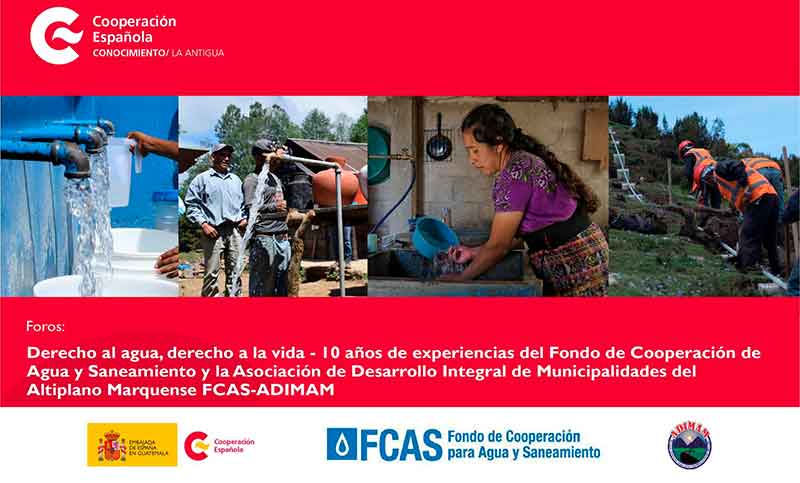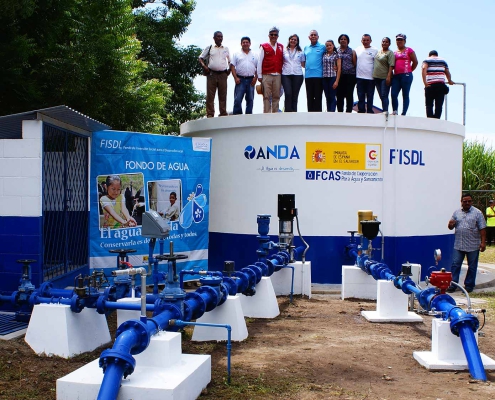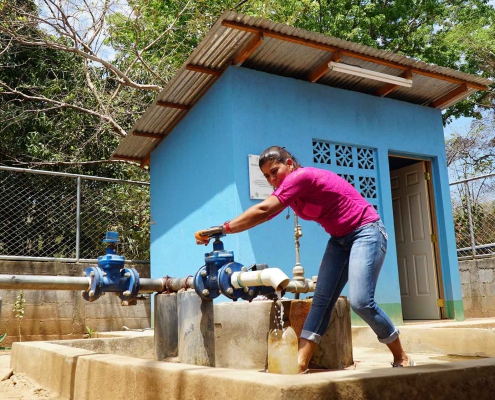Completed programmes in Guatemala

2021 also marked the end of other projects, which commenced years ago. In September the Water and Sanitation Programme with a basin approach in the upper part of the Cuilco River sub-basin (GTM-014-B) came to an end in Guatemala. It was a successful experience working with the Integral Development Association for the Integrated Development of Municipalities of the Altiplano Marquense (ADIMAM) and it had a significant positive impact on the area. Among other achievements, the programme has improved or facilitated access to safe water and/or sanitation for more than 75,000 people.
In total, 44 drinking water and sanitation systems were built, 30 were rehabilitated, 14 municipal offices were strengthened, and more than 70 hectares were reforested, with an emphasis on environmental protection. It also contributed to a 97% reduction in water carrying and 72% reduction in acute diarrhoeal diseases in children under 5 years of age. To mark the end of the programme, the Right to Water, Right to Life campaign was held in Guatemala, which served to celebrate and raise awareness of the Fund’s 10 years of experience in the Central American country.
As part of this campaign, an exhibition, round tables and the recording of several videos explaining how the project has changed the lives of the beneficiaries were held.
Completed programmes in El Salvador, Chile and Honduras

In El Salvador, also in September, the Integrated Water, Sanitation and Environment Project (SLV-056-B) came to an end. Its goal was to increase the coverage, quality and sustainability of drinking water and sanitation services, as well as to strengthen the Integrated Water Resources Management in the sector, providing tools for water governance and strengthening institutional capacities. The programme provided more than 19,000 people with access to both drinking water and sanitation in their homes and contributed to raising the awareness of more than 4,000 people. It also had a significant impact on environmental protection, promoting the implementation of agro-ecological practices for the protection of water recharge areas – through the establishment of a tree nursery and the delivery of trees to families in the communities, among other activities.
On the other hand, in December, the implementation of the programme Support for the reduction of the deficit in drinking water and sanitation coverage in the framework of the Millennium Development Goals targets for Chile (CHL-001-B) was completed. The intervention benefited more than 18,000 people in total (14,050 with access to drinking water and 4,930 with basic sanitation), and provided training to local organisations and awareness-raising on water and sanitation to 800 people, reducing inequalities and improving the quality of life of the population in dispersed rural areas of Araucanía, where lives a large part of the country’s most vulnerable population of Mapuche ethnicity.
Moreover, in Honduras the programme Increase of water and sanitation coverage and integrated management of the lower and middle Goascorán river basin (HND-015-B) was completed. This intervention successfully supplied drinking water to more than 11,000 people and sanitation services to 7,000 people, improving the living conditions of the inhabitants of the Goascorán river basin, from an Integrated Water Resources Management approach, supporting the strengthening of institutions and with a significant component of adaptation to climate change. The intervention focused on 11 municipalities in the area, grouped into two commonwealths: the Commonwealth of Municipalities of Southern La Paz (MAMSURPAZ) and the Commonwealth of Municipalities of the Border (MAFRON).
.
Completed programmes in Nicaragua and Colombia

In Nicaragua, the Programme for the improvement and expansion of drinking water services in 7 cities, was completed between 2015 and 2021. This programme was implemented with the collaboration of the Inter-American Development Bank (IADB) with a total amount of 25 million euros donated by the Water Fund. During 2021, the construction of the Drinking Water Treatment Plant (DWTP) and the distribution network, including house connections, was completed. The system was commissioned at the end of 2021, guaranteeing drinking water to more than 65,000 people, including the inhabitants of the city of Bilwi and the indigenous Miskito communities of Sinsin, Kuakuil, Boom Sirpi and Yulu Tingni. In Nicaragua, the Programme for the improvement and extension of drinking water and sewage services in Nicaraguan localities was completed within the framework of Phase I of PISASH (Integral Sectoral Programme for Water and Human Sanitation), which provided 27,000 people with access to drinking water and more than 22,000 with access to basic sanitation and treated wastewater.
Finally, it should be noted that an extensive programme carried out in Colombia called Expansion of El Bosque water treatment plant and supply to the neighbourhoods in the south-western area of Cartagena de Indias (COL-036-B) is nearing completion (by the end of January 2022). This has become a comprehensive initiative to improve living conditions in the neighbourhood in addition to improving water and sanitation services, it included training initiatives, creating community productive initiatives, awareness-raising and high local participation. In this country, it was also completed the programme named COL-037-B, a programme funded by the AECID, with similar objectives and arising from the synergies promoted by the Fund, which is described in more detail in Section 4.3 of this report..

